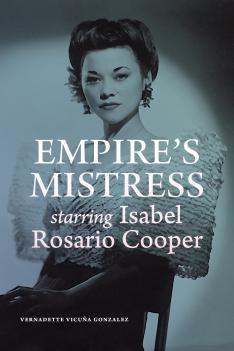The author: Vernadette Vicuña Gonzalez ’96 is a professor of American studies at the University of Hawai‘i at Mānoa, and the author of Securing Paradise: Tourism and Militarism in Hawai‘i and the Philippines, and co-editor of Detours: A Decolonial Guide to Hawai‘i.
Opening lines: The story begins with a dead woman whose death was caused by heartbreak. At least, we are told this repeatedly, so that it becomes truth. Women dying for love are tragically beautiful, inspiring, wistful, longing. The pathos of thwarted romance obscures what might otherwise be ugly, bitter, or something yet unimagined.She is caught in a familiar and worn plot, a clichéd convention of empire. Surrounded by the chaos and uncertainty of war and colonial occupation, the lively, exotic young woman falls in love with the powerful white soldier. Their affair is illicit but inexorable, defying the obstacles of race, culture, and nationality that ultimately derail their devotion. The last act always ends with her impossible yearning for his fidelity and return. Her death is inevitable. She can only die in this plot. He goes on to live the rest of his life happily ever after, his future secured by her sacrifice. Nonetheless, it is a delicious and compelling fiction, told again and again until it acquires a force of its own.
This book is an attempt to unravel the story of one particular dead, beautiful woman named Isabel Rosario Cooper, whose life has always been reduced to this story or something like it.
Isabel Cooper, when she is talked about at all, is cast as General Douglas MacArthur’s notorious one-time mistress. Most often, she is invoked only to lend flavor to otherwise predictable accounts of his military and political career, which pivots around the dramatic “rescue” of the Philippines from Japanese occupation near the end of World War II. As the story goes, the mixed-race vaudeville and film actress is plucked from the Philippine Islands by the much older MacArthur and brought to Washington, D.C., to continue their affair. After some time, they part ways acrimoniously. He then redeems a lackluster military career in Washington by becoming a hero in the noblest war, returning to the Philippines dramatically (and in well-documented fashion) as its liberator. She labors in obscurity in Hollywood and dies of a drug overdose. Her death is labeled a suicide, the cause, unrequited love.
In the decades that follow, as biographies both lionizing and denigrating MacArthur are published, her death (when noted at all) is ascribed to her despair at her lover’s rejection. No matter that she died three decades and two husbands after MacArthur, Isabel Cooper cannot extricate herself from the arms of the general or from the gravitational pull of this cherished story line.
I have tripped over variations of this plot over the last two decades, trying to piece together Isabel Cooper’s side of the story.
* * *
My first encounter with Isabel Cooper — or her thinly veiled counterpart — was through Ninotchka Rosca’s novel State of War, which depicts the surreal colonial world of the United States’ occupation of the Philippines in the twentieth century. In it, Isabel Cooper’s double is the unnamed mistress of the American military governor, a “Eurasian chanteuse who came to the club now and then—’only as a diversion.’” Rosca describes a well-kept, exquisite woman with a “sultry, passionate contralto, which suited her slim, high-breasted, lithe body, her blue-black hair piled high on her head, crowning an oval face of incredibly delicate beauty.”
In the novel, as the object of desire, she haunts the edges of the action, a pleasurable distraction from (and a softened metonym of) the main plot of torture, war, and revolution. Rosca’s songbird finds herself pulled along in the wake of her lover and is lost in the ebbs and flows of modernity and tradition. She languishes in an opiate hallucination after the war. Her fate reflects the treacherous consequences of the American empire’s so-called deliverance, those unfortunate side effects of “white love.” Neither romance — with the general or with colonialism — are plots in which the heroine survives, no matter the promises whispered in the fevers of desire.
Rosca’s fictional chanteuse, it turned out, was a real-life woman, and not just an archetype of the tragic mixed-race concubine. Biographers of the general note her intriguing presence in the margins, but for the most part, treat her like a shallow side dish, the classic Oriental seductress. In William Manchester’s sprawling 1978 biography of MacArthur, American Caesar, she is a juicy morsel of gossip. Manchester describes a powerful older man wheedling love from a petulant and spoiled young woman with gifts of a lavish apartment and an “enormous wardrobe of tea gowns, kimonos, and black-lace lingerie.” Predictably, Isabel Cooper is depicted as a lovely doll that could be kept in boudoir costume, at the ready for his sexual whims. Manchester quotes a Washington lobbyist who met her: “I thought I had never seen anything as exquisite. She was wearing a lovely, obviously expensive chiffon tea gown, and she looked as if she were carved from the most delicate opaline. She had her hair in braids down her back.” That the lobbyist uses opaline — an opaque, colored glass — to describe Isabel Cooper is illuminating. Encounters with Isabel Cooper, even those seemingly intimate ones, cannot or do not choose to delve beneath the smooth surface of her exoticized beauty and sexuality. Her typecasting demands no further explanation.
Other biographies of MacArthur portray Isabel Cooper as a Delilah to his Samson, as the linchpin to a potential scandal that could destroy his career, or as the adoring and submissive lover who appeases the wounded masculinity eroded by his recalcitrant first wife and his domineering mother. In the decades since the first flurry of MacArthur biographies, the occasional tabloid, magazine article, newspaper column, website, or blog resurrects Isabel Cooper as an entertaining bit of trivia, solidifying the patterns and plots that define her. There is little variation from the familiar archetype, because it is easier to repeat, with some embellishment, a titillating but almost comforting story of a beautiful woman who yearns, to a tragic end, for her man. With repetition, all these narratives congeal into a truth that is hard to shake.
A beautiful woman dying of heartbreak is a seductive fiction.
Sixty years after her suicide, this fiction has proven its durability. Yet there is something there, too, in the way that the dead refuse to rest. Her apparition lingers, I suspect, because this flimsy plot — the tragic romance, and her casting as the doomed Eurasian — cannot contain her. The mix of romance, sexual scandal, and tragedy that narrates Isabel Cooper has an undeniably magnetic pull: It has the stuff of epics and the tantalizing elements of gossip and rumor.
Perhaps it is time to tell her story in a different way.
Review: “Vernadette Vicuña Gonzalez crafts a gorgeous and meticulous portrait of one of the most intriguing women of the twentieth century, Isabel Rosario Cooper. Woven out of ghosts of texts and archival fractures and gaps, Empire's Mistress is a replete mystery tale, feminist biography, Hollywood story, intimate study of Philippine-U.S. relations, and a masterful work of postcolonial noir. Above all, Empire's Mistress is a haunting, by which afterlives of empire address our contemporary dilemmas about how to articulate, frame, and center unspoken lives to tell history accurately. A deeply satisfying work of exhumation, Empire's Mistress makes complex history live, and I'm grateful for Gonzalez's unflinching, refractive, and always revelatory gaze on that history.” — Gina Apostol, author of Insurrecto


